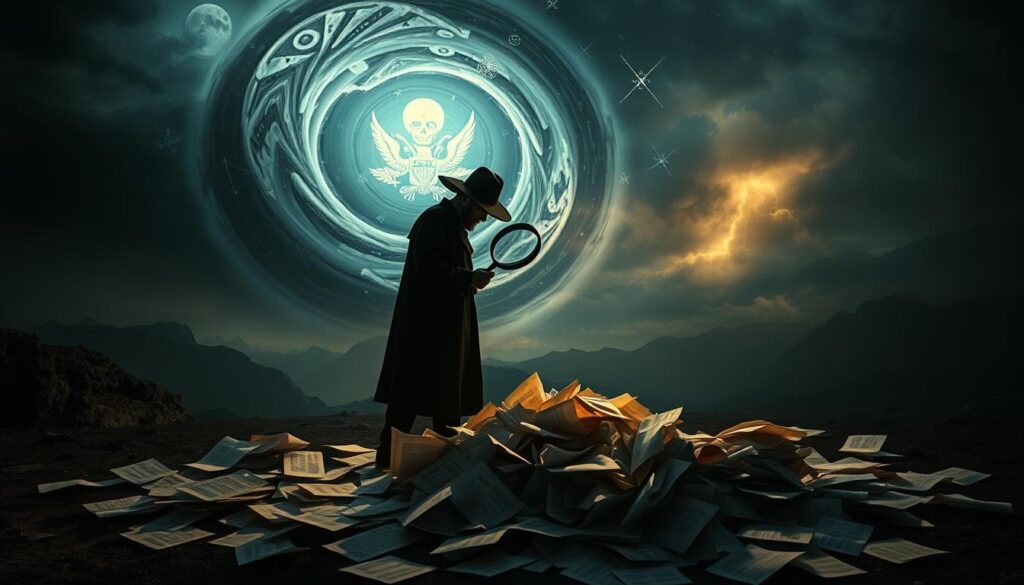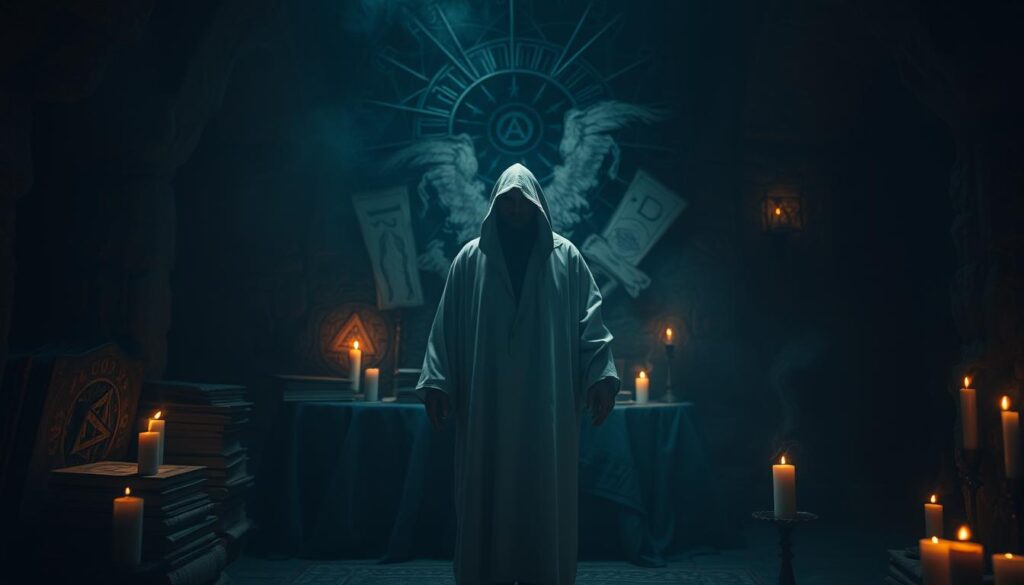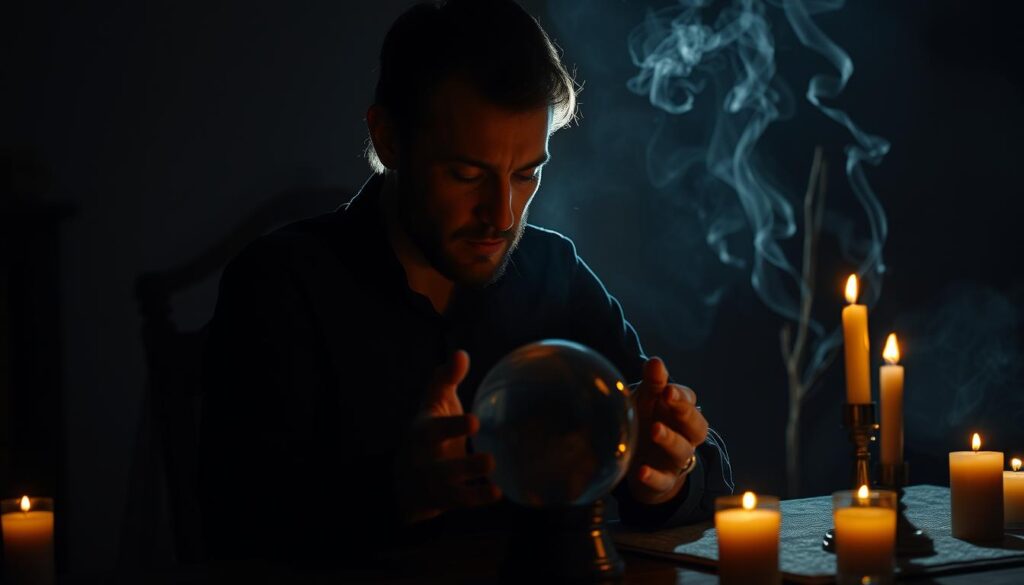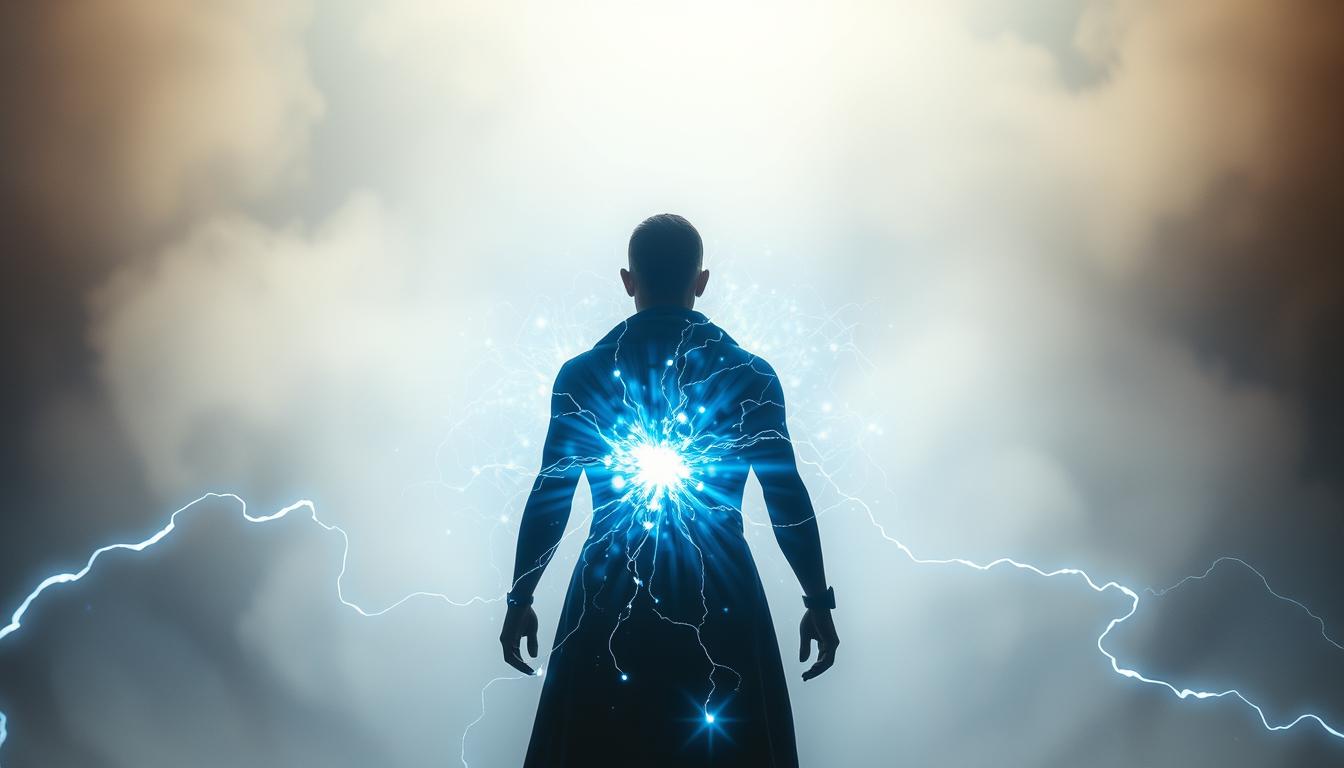Ever wondered if your mind can move objects or see things far away? This curiosity led scientists and philosophers to explore psionics. They studied psychic abilities, including extrasensory perception and telekinesis. Their work sparked debates in Europe and the United States, with some calling it pseudoscience.
In the late 19th century, groups like the Society for Psychical Research looked into mind powers. They collected data on mediums and supernatural events. This work caught the public’s attention and sparked ongoing debates about psychic abilities, also known as psi.
Key Takeaways
- Psionics involves exploring mind powers beyond standard senses.
- Early research on psychic abilities drew both interest and skepticism.
- The Society for Psychical Research examined telekinesis and ESP.
- Critics challenged the validity of medium-based experiments.
- Debates on extrasensory perception shape modern views on the paranormal.
Definition of Psychic Powers and Their Early Roots
Researchers have always tried to explain psychic phenomena. They want to understand things that go beyond what we can see. Early spiritualist groups believed in mediums who could see beyond the physical world.
The Society for Psychical Research was formed to study these claims. They looked at people who claimed to have special abilities like clairvoyance and psychokinesis. They used science to test these claims.

Some thought that psychic energy could make things move, like table-tipping. This idea led to the belief that our minds can affect the world around us. In the 1950s, the term “psionics” was used to mix engineering with paranormal studies.
The word “psi” was first used in 1942. “Psion” was coined in 1951 as a way to measure mental power. For more information, check out this research archive.
William James once wrote, “If you wish to upset the law that all crows are black, it is enough to prove one single crow to be white.”
Scientists and fans alike kept exploring the idea of psychic powers. They tested things like psychokinesis, even though the results were not always clear. This kept the debate alive about what our minds can do.
Exploring Psionics and Human Potential
For decades, the idea that the human mind might harbor hidden, extraordinary abilities has captured the imagination of scientists, mystics, and conspiracy enthusiasts alike. Psionics—the study and purported harnessing of psychic phenomena—sits at the crossroads of fringe research and cutting-edge neuroscience.
Among the most tantalizing aspects of this field is remote viewing, a practice that once occupied the shadowy corridors of classified government programs and that continues to stir debates about the true extent of human potential.

The Allure of the Unseen
Remote viewing is the ability to describe or “see” distant locations or events without relying on traditional sensory input. Proponents argue that trained individuals can access information beyond the confines of space and time, tapping into a universal repository of knowledge.
During the Cold War era, this concept was more than a mere parlor trick—it was at the center of highly classified research initiatives. Projects like the much-discussed Stargate Project, later declassified, suggest that governments once believed that psionic abilities could offer an unconventional edge in intelligence gathering.
Inside the Black Projects
Whispers about secret “black projects” have long circulated among those fascinated by the paranormal. While mainstream science remains skeptical, several accounts hint at a broader, covert interest in psi phenomena. Leaked documents and insider anecdotes allege that, behind layers of security clearances and government red tape, researchers explored the possibility of using remote viewing for espionage and military strategy.
These stories—often described in hushed tones—reveal that a select few individuals, sometimes called “psychic operatives” or “psychic spies” were trained to map out hidden sites, monitor enemy movements, or even predict potential threats.
Although much of this research was officially terminated and cloaked in bureaucratic secrecy, its legacy lives on. Researchers like Ingo Swann, Pat Price, and others emerged as emblematic figures of this unconventional science, their experiences fueling both scientific inquiry and science fiction alike.
Their reported successes, however anecdotal, have contributed to a lingering question: if such abilities exist, how can we harness them to unlock the untapped reservoirs of human potential?
Beyond the Fringe: The Intersection of Science and Speculation
Modern neuroscience has begun to hint at a more dynamic mind than previously imagined. Advances in brain imaging and cognitive studies suggest that our neural networks have a latent capacity for plasticity and adaptability that could, in theory, support phenomena once dismissed as mere fantasy.
Practices like meditation, biofeedback, and other mind-body interventions show that with the right training, individuals can achieve altered states of consciousness.
Could these techniques eventually dovetail with psionic research to help us better understand—or even enhance—remote viewing and related psychic abilities?
Critics argue that the evidence for psi phenomena remains anecdotal mainly and fails to meet the rigorous standards of conventional science. The reproducibility of remote viewing experiments has been a persistent challenge, with successes often mired in methodological debates.
Yet, for many, the allure of exploring the human mind’s uncharted territories outweighs the scientific caution. This open-minded yet critical approach underscores the dual nature of psionics research: a field that is as much about the mystery of human potential as it is about the pursuit of empirical validation.
The Human Element in a World of Secrets
At its heart, the study of psionics is a deeply human quest. It reflects our enduring desire to transcend the physical limitations of our senses and tap into a broader spectrum of awareness.
Whether viewed as a relic of Cold War intrigue or as a nascent field poised to revolutionize our understanding of cognition, remote viewing, and its related psi phenomena challenge us to reconsider the boundaries of human potential.
In today’s world—where neuroscience is rapidly advancing and the mysteries of the mind continue to unravel—psionic research serves as both a cautionary tale and a beacon of possibility.
The “juicy” secrets from those bygone black projects may be shrouded in controversy, but they remind us that even the most outlandish ideas can spark genuine inquiry.
As we push further into the realms of what is scientifically known and what remains mysterious, one thing is clear: the exploration of psionics is as much a journey into our collective potential as it is an investigation into the unknown.
Basic Principles of Mental Powers
Psionic ideas often involve telepathy or remote viewing, showing that mind power might be more than we think. These powers can start from stress or strong emotions, making them both fascinating and hard to predict. The idea that our minds could change reality makes us question what we can really do.
How Psionics Relates to Parapsychology
Parapsychologists try to find the science behind these special talents. They use labs to see if these powers are real or just chance. This research keeps the debate going about what new abilities might come next in human evolution.
| Psionic Ability | Key Feature | Pop Culture Influence |
|---|---|---|
| Telekinesis | Move objects using thought | “Scanners” head-exploding power |
| Pyrokinesis | Control fire or ice | Inspired by “Firestarter” |
| Mind Reading | Access hidden thoughts | Seen in many superhero tales |
The Connection Between Telepathy and Extrasensory Perception (ESP)
Telepathy is a fascinating area of extrasensory perception. In the 1930s, J. B. Rhine tried to measure thought transfer. W. S. Cox conducted large-scale trials in 1936 with 132 people. Despite Cox’s efforts, no solid proof was found, leaving many questions.

Studies on mental manipulation have sparked debate. Some believe telepathy could lead to deeper psychic development. Ganzfeld experiments aimed to improve methods by reducing distractions. Yet, many still doubt the existence of extrasensory perception.
Skeptics have pointed out possible flaws in these studies. These include poor randomization and sensory leakage that could have influenced results.
- J. B. Rhine conducted influential ESP trials with Zener cards at Duke University.
- W. S. Cox found no telepathy indicators after 25,064 trials in 1936.
- Joseph Jastrow critiqued the anecdotal dimension of Rhine’s data in 1938.
- Four psychology departments failed to reproduce Rhine’s reported outcomes.
- A meta-analysis showed no conclusive effect when research errors were corrected.
Some believe that if minds can share information beyond usual senses, mental energy or energy manipulation might be involved. People report feeling more aware during deep relaxation or spiritual practices. This keeps the idea of telepathy alive.
Reports of ufo contact and potential uap communication add to the intrigue. These stories fuel ongoing discussions about human consciousness and the limits of our perception.
Mind Over Matter: Introduction to Psychokinesis
Psychokinesis is a fascinating part of psi phenomena. It lets people move or change objects just by thinking about it. Stories about these powers make many curious about what humans can do.

Some think it’s a way to extend psychic abilities. Others see it as a way to influence our daily lives. Many are curious if it shows a connection to unseen energy. Studies show about 40% of people can affect small items without touching them.
Historical Accounts of Psychokinesis
In the late 1800s, mediums like Henry Slade amazed people. They made tables float or moved objects without touching them. This sparked a lot of interest and debate about their abilities.
Scientific Endeavors to Study PK
Scientists have tried to study psychokinesis. They’ve used random number generators and dice-rolling tests. But, the results are not always the same. Some believe they can prove it, while others doubt it.
Energy Manipulation and Spiritual Psychic Practices
Many people explore ways to define psychically guided abilities through balancing subtle energy fields. The definition for psychic has changed from mysterious folklore to practices involving force channels. This shows how psychic definition can blend spiritual views with everyday use. People seek psychic power by tuning into inner vibrations and improving their mind’s abilities.

Some advanced practitioners can shape energy into barriers or weapons. Alfred Reinhold Webber is known to move mountains with psychic matrices. Characters like Jean Grey show incredible feats, hinting at the mind’s vast potential.
Chakras, Auras, and Psychic Energy
Spiritual systems talk about chakras as energy links. Auras show emotional and physical states, helping healers remove blocks. These ideas suggest that understanding psychic can deepen our awareness by aligning body, mind, and spirit.
Methodologies for Psychic Development
Techniques like breath control and meditation improve inner flow. Guided visualization offers a clear path. Regular practice can boost intuition and refine psychic definition. Many feel empowered by this journey of self-discovery.
| Technique | Example | Potential Outcome |
|---|---|---|
| Meditation | Focusing on breath | Enhanced calm and awareness |
| Visualization | Imagining energy flow | Stronger connection to spiritual force |
| Aura Reading | Observing subtle colors | Clarity about one’s emotions |
Clairvoyance, Clairaudience, and Other Clair Senses
Many people wonder about psychics and what they do. They ask how to spell psychic and what psychics mean. These questions show the interest in “clair” abilities, which are unusual ways to get insights.
Clairvoyance lets people see visions through special chakras. These visions start as blurry images and then become clear. Clairaudience is about hearing sounds or words that others can’t. Clairsentience is feeling emotions or physical sensations about someone or something.

People talk about psychically meaning when they get impressions without knowing why. Some use clairtangency to sense things by touching objects. Others get sudden knowledge through claircognizance. A few can even sense smells or tastes from beyond.
To balance these sensitive energies, some do grounding exercises like earthing or yoga. Certain crystals, like Selenite for clairvoyance and Labradorite for claircognizance, can help. Everyone can develop these gifts with practice and awareness.
Today, we talk more about psychics and how to spell psychic correctly. This interest in extrasensory perception opens us up to exploring the unknown. It shows us that our senses might be more complex than we think.
- Clairvoyance: Visual messages or symbolic scenes
- Clairaudience: Words or sounds from unseen realms
- Clairsentience: Emotional or physical impressions
- Clairtangency: Insights gained through touch
Remote Viewing and Its Relevance to UAP and UFO Research
Remote viewing has caught the interest of many in UAP and UFO studies. It’s a mental skill that lets people see things beyond what’s normal. This has led to questions about psychic abilities and their role in understanding strange aerial events.

Some believe remote viewing offers a peek into spiritual psychic abilities. Others point out that the results are not clear-cut. Simply put, being psychic might mean having senses that go beyond the usual.
Early tests showed some people could guess targets with surprising accuracy. A 1987 test even saw a 77% success rate. This sparked hopes of new discoveries.
Historical Military Applications
The military has explored psychic abilities in formal settings. Some individuals showed remarkable talent, earning the label of psychic gifts. Stargate used strict methods to measure their skills.
A 1974 test by Pat Price was 98% accurate. This raised interest in the potential of psychic abilities.
- Official termination of Stargate in 1995
- At least six “star performers” identified
- Partial declassification by the CIA in July 1995
How Researchers Interpret Sightings
Remote viewing in UFO research often raises questions about psychic abilities. Experts look at eyewitness accounts, physical evidence, and any psychic impressions. They approach this with an open mind, but skepticism is common.
Learn more about sensitive topics in this policy.
| Program | Duration | Notable Result | Outcome |
|---|---|---|---|
| Project STARGATE | 1975-1995 | $20 million in funding | Terminated in 1995 |
| 1987 RV Exercise | N/A | 77% overall accuracy | Partial data declassified |
| 1974 Pat Price Test | N/A | 98% dimension match | Heightened psychic meaning in english interest |
Ethical Considerations in Psychic and Spiritual Practices
Some people turn to psychics for hope or clarity when things seem uncertain. A caring approach can build trust. But, it’s also important to be aware of potential risks to protect both the psychic and the client.
Many are curious about what psychics can do in sensitive situations. There’s a risk of exploitation if vulnerabilities are not checked. So, setting clear boundaries is crucial for anyone offering spiritual guidance.

In the 19th century, debates about healing and spirit phenomena appeared in several publications. These included:
- Journal du magnétisme and its cases of medical applications
- Revue Spirite, founded by Allan Kardec
- The Zoist, edited by John Elliotson
These journals highlighted controversies over responsibility and integrity. Some mediums claimed to have performed miracles or seen visions. But critics questioned their truthfulness.
Scholars and readers looked into the ethics of psychic practices under mesmeric experiments. They tried to find a line between good intentions and questionable actions.
Supporters of spiritual guidance say psychics often stress free will and self-determination. The Oxford dictionary defines psychic as subjective. People looking for ethical choices might ask, “What does a psychic definition require for responsible work?”
Clear disclaimers, empathetic communication, and transparent methods can help. True support reminds seekers that real decisions are theirs to make.
Overcoming Skepticism and Debunking Common Myths
Many people wonder if real powers exist beyond what we know. James Randi and skeptics offer money for proof of these powers. They say tricks or bad tests can fool people.
Surveys show 21% to 53% believe in weird stuff like ghosts and magic. A big 73% of Americans think there’s truth in these topics. This shows a lot of people are curious about psychic powers.

Women are more likely to believe in these things than men. But, learning to think critically can make people doubt these claims. Researchers use special tests to find out if psychic powers are real.
Understanding Scientific Critiques
There’s a big debate about what psychic powers really are. Scientists want to see the same results over and over. Some say spiritual powers might need special conditions that labs can’t provide.
Experts say one-time shows don’t prove anything. They say we need solid evidence to believe in psychic powers.
Popular Misconceptions in Media
Movies and TV often show people doing amazing psychic things right away. This makes people think it’s all true. But, it’s important to remember that these shows are not real.
It’s key to keep an open mind but also look for solid evidence. This way, we can understand what’s real and what’s not.
The Role of Mediums and Psychic Readings in Modern Society
Early Spiritualist movements sparked public interest in those who communicate with realms beyond. Many wonder about psychic medium abilities when they see people share insights about life and loss. The term psychic word captures the essence of extraordinary senses, connecting the physical and spiritual worlds.
Today, psychic readings have grown thanks to digital platforms. They attract both believers and skeptics. Those claiming esp abilities say they use telepathy or clairvoyance to access hidden knowledge. Surveys show that about 30% of Americans believe in medium powers, making the market worth over $2 billion. The history behind these terms shows ongoing debate and curiosity.
- 20% of Americans have consulted a medium at least once
- Belief in paranormal ideas tends to increase with age and exposure
- Female clients represent around 70% of professional psychic services

| Statistic | Audience Insight |
|---|---|
| 30% of Americans | Express belief in paranormal abilities |
| $2 Billion | Annual revenue in psychic services |
| 20% | Have received a psychic reading |
| 75% | Seek mediums for relationships or grief support |
The Relationship Between Psychological Powers and Psychic Gifts
Many wonder if our intuition is linked to hidden senses or special forces. Questions about psychic spelling and power meaning make us think differently about our minds. Scholars discuss the line between mental skills and paranormal abilities, opening up for practical uses.

Some say a psychic is someone who picks up on subtle signs that others miss. Others believe psychics have real supernatural connections. The history of the term psychic in Latin shows a deep link between the mind and soul. This mix of views encourages us to keep exploring the brain’s abilities.
Distinguishing Mental Abilities from Paranormal
Being able to spot patterns and understand emotions can seem magical. Some experiences might come from empathy or sharp observation, making them seem supernatural. This difference helps us understand the difference between learned skills and things beyond our usual understanding.
Case Studies of Psychic Medium Abilities
There are stories of mediums who share amazing details about someone’s past, sparking debate. These cases make us think about what makes ordinary awareness different from deeper insight. They make us question if our minds have abilities we don’t fully understand yet.
Practical Techniques for Developing Mind Reading Skills
Many people see mind reading as a way to understand others deeply. They start with simple tasks, like ignoring distractions in busy places. Others try the Ganzfeld procedure to focus their inner thoughts.
Using a deck of cards is a fun way to practice. Players guess the next card, learning how their mind works. Keeping a journal is also key. It helps track progress and understand emotional clues.

Being empathetic and open are key traits for mind readers. Yet, these don’t mean you can read minds. Paying attention to eye movements and calm eye contact can show hidden feelings. Listening well also helps grasp what’s not said.
Many turn to Purple Garden for mind reading sessions. With 319 mind readers, sessions start at $0.99 per minute. A $1 intro rate attracts those curious about psychic abilities.
Regular practice and a calm mind are essential. Meditation helps tune into subtle signals. As trust in instincts grows, so does connection with others. This methodical approach opens up new ways of understanding.
Harnessing Mind Powers Through Meditation and Visualization
Many spiritual traditions believe that inner calm can unlock hidden psychic abilities. Deep breathing and focused imagery may strengthen neural pathways. This is seen as a direct route to metaphysical abilities.
Certain meditators report seeing vivid mental landscapes. These landscapes reveal intuitive insights on life challenges and personal growth.

Some accounts recount telekinesis, clairvoyance, and levitation emerging from regular mindfulness sessions. Researchers track anecdotal reports of enhanced energy perception and synchronicities. Yet, no psychic medical term has been officially validated by mainstream science.
Steady guidance and self-awareness appear central to shaping traits of psychics. They maintain discipline in daily routines.
Deepak Chopra once said, “In the midst of movement and chaos, keep stillness inside of you.”
Combining Energy Work and Spiritual Abilities
Leaders in holistic circles believe combining visualization with energy work fosters deeper connections. This synergy could illuminate the true psychic ability meaning for those who seek personal transformation. People who refine their energy flow often describe subtle shifts in consciousness.
They attribute new psychic traits to consistent practice.
Daily Exercises for Psychic Enhancement
A few minutes of mental imagery can focus intention by up to 50%. This boosts creativity and concentration. Basic practices include visualizing protective light and performing mindful check-ins.
Noting subtle vibrations in the environment is also important. These small steps may nurture traits of psychics driven to explore broader frontiers of perception. Repetition shapes lasting progress, forging clearer pathways toward expanded awareness.
Common Traits and Characteristics of a Psychic Person
Many people wonder what it means to be psychic when they feel things they can’t explain. They might ask how to spell psychic correctly. Those who explore this area often have a strong empathy, allowing them to sense subtle energies.
Some ask what psychics see in moments of insight. They might describe vivid images or feelings that hint at the future. The abilities of psychics vary, but many share a heightened sense of awareness and focus.
Studies show that about 70% of psychics have one or two main abilities. Around 25% use remote viewing, and 30% try to predict the future. Empaths, making up about 15% of people, can feel others’ emotions directly.

These traits grow when people learn to understand signs and improve their awareness. They often feel a need to guide others through tough times. Cultivating intuition involves reflecting on experiences and trusting the signals received.
- Clairvoyance: Visual impressions or inner images
- Clairaudience: Auditory cues or distinct sounds
- Clairsentience: Feelings and energetic sensations
| Talent/Perk | Cost/Value | Key Benefit |
|---|---|---|
| Psi-Sensitivity | 15 points/level | Boosts all psionic skills |
| Devotion Talent | 5 points/level | +1 to mental skills (Autohypnosis, Psychology) |
| Occultist Talent | 10 points/level | +1 to history and cultural knowledge skills |
| Dark Communion Resilience | Varies | +1 to resist adverse spiritual effects |
| Psychic Disconnect | -1 point | Prevents access to certain psionic abilities |
| Weirdness Magnet | -15 points | Draws odd phenomena; grants impulse buy points |
Applying Psychic Abilities in Everyday Life
Many wonder what psychic means when day-to-day events seem guided by an inner compass. Some call that subtle sense a psychic ability meaning in english that reveals new perspectives. A good psychic dictionary tracks these signs, whether it’s a flicker of insight or an undeniable pull toward a choice. Friends might say “you must be psychic” if your hunches lead to a big breakthrough.
Small signals often grow more vivid with practice. One person shared a story about choosing a job based on a gut reaction that later felt like a psychic vision meaning everything clicked. Another recalled speaking affirmations that acted like a spell psychic meaning words can shift outcomes. Trust builds when patterns reappear, so journaling and reflection can sharpen this gift. Balancing intuition with logic keeps decisions grounded yet open to larger currents.
Strengthening psionic talents can involve structured steps. A 2d6 roll decides Psionic Strength, which recovers one point per hour once three hours pass. Training a new talent requires four months and costs Cr. 100,000. Concentration checks matter when manifesting power, and each attempt after the first suffers a -1 DM. The table below highlights a few everyday disciplines:
| Psionic Talent | Training Time | Difficulty (DM) | Psi Cost Example |
|---|---|---|---|
| Telepathy | 4 months | +4 | 2 + Range |
| Clairvoyance | 4 months | +3 | 2 + Range |
| Telekinesis | 4 months | +2 | 2 + Range |
Conclusion
How people see psychic life meaning shows their views on mind-based abilities. Some try intuitive exercises to understand psychic patient meaning. They believe it connects mental growth to better well-being.
Others find psychic meaning in stories or research. This sparks debates between spiritual beliefs and science. Wondering what is a psychic mean leads to deep talks on human thinking.
In tabletop games, like OD&D and AD&D, psionic features raise these questions. An OD&D hero might get psionic powers with a 10% chance. An AD&D character starts with a 1% chance, but can improve with better ability scores.
This shows how characters can gain new powers. It lets players explore psychic thoughts meaning in a story. Some characters learn over ten disciplines, showing the endless possibilities of psychic powers.
These elements encourage curiosity about the mind and spirit. They make us think about psychic life meaning in different ways. Whether people believe or question it, the mystery of what psychic mean keeps sparking interest in exploring mental frontiers.

